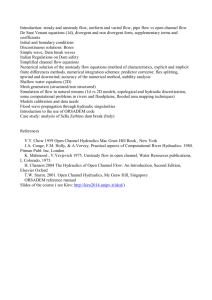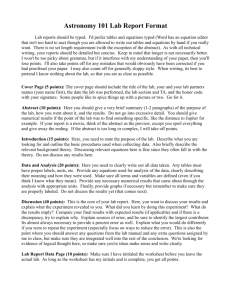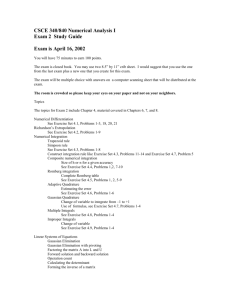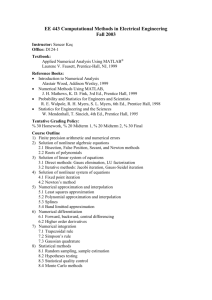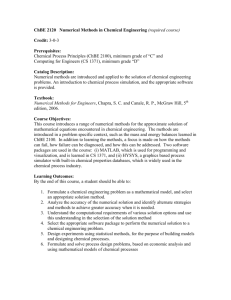Brief Description of MSc Courses
advertisement
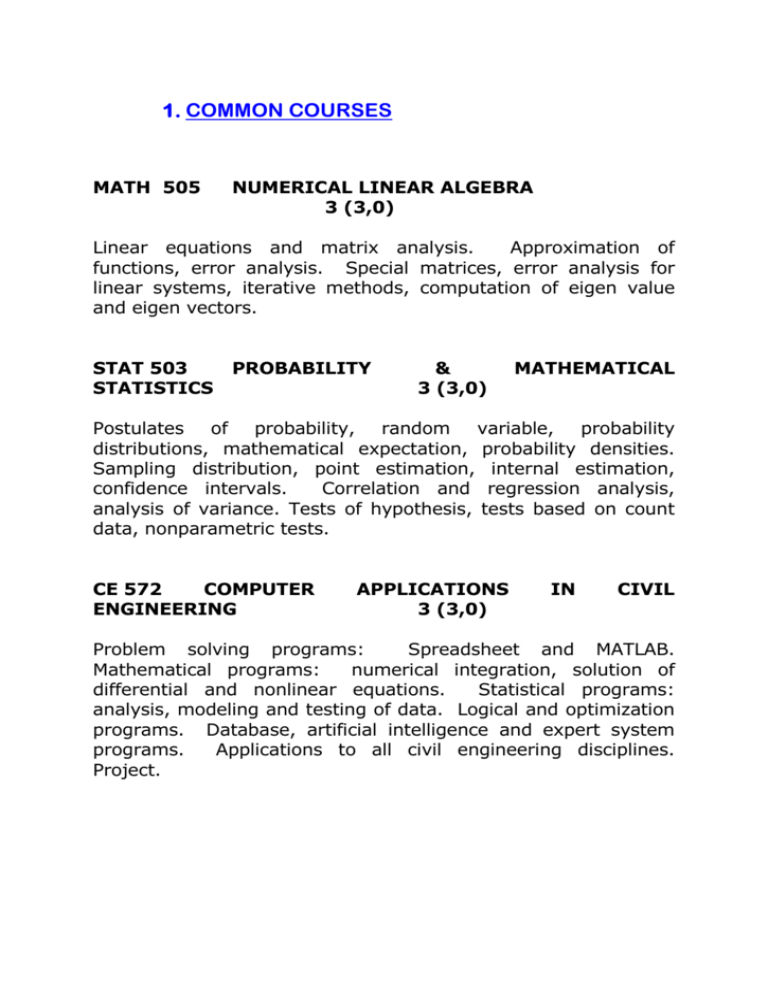
1. COMMON COURSES MATH 505 NUMERICAL LINEAR ALGEBRA 3 (3,0) Linear equations and matrix analysis. Approximation of functions, error analysis. Special matrices, error analysis for linear systems, iterative methods, computation of eigen value and eigen vectors. STAT 503 STATISTICS PROBABILITY & 3 (3,0) MATHEMATICAL Postulates of probability, random variable, probability distributions, mathematical expectation, probability densities. Sampling distribution, point estimation, internal estimation, confidence intervals. Correlation and regression analysis, analysis of variance. Tests of hypothesis, tests based on count data, nonparametric tests. CE 572 COMPUTER ENGINEERING APPLICATIONS 3 (3,0) IN CIVIL Problem solving programs: Spreadsheet and MATLAB. Mathematical programs: numerical integration, solution of differential and nonlinear equations. Statistical programs: analysis, modeling and testing of data. Logical and optimization programs. Database, artificial intelligence and expert system programs. Applications to all civil engineering disciplines. Project. 2. COURSES IN STRUCTURAL ENGINEERING CE 562 ENGINEERING ANALYSIS 3 (3,0) Concepts of vector and function space. Formulation of problems in engineering in discrete and continuous media. Boundaryeigen-and initial-value problems; direct and energy approaches. Finite difference, finite element, boundary element and other numerical methods of solutions. Computer implementation. CE 563 ADVANCED STRUCTURAL ANALYSIS 3 (3,0) Energy principles, stiffness and flexibility methods, and their applications to non-prismatic members, arches, rings, curved members, cables, frames with semi-rigid connections. CE 564 ADVANCED SOLID MECHANICS 3 (3,0) Torsion of non-circular solid and thin walled open sections; shear center. Shear deformations in beams. Theories of failure. Analysis of curved bars and thick walled cylinders CE 565 THEORY OF PLATES AND SHELLS 3 (3,0) Stresses and deformations in a plate element. Theory of thin elastic plates. Analytical solutions of rectangular and circular plates. Approximate methods and numerical methods. Stresses and deformations in an element of shell of revolution. Membrane theory of shell of revolution. Cylindrical shells. CE 566 PLASTICITY IN STRUCTURAL ENGINEERING 3 (3,0) Fundamentals of theory of plasticity. Inelastic behavior of sections, members and structures. Fundamentals and basic theories of limit analysis. Methods of analysis of structures in the plastic range. Plastic design of continuous beams and frames. CE 567 STABILITY OF STRUCTURES 3 (3,0) Bending of structural members subjected to axial and lateral loads. Elastic and inelastic buckling of compression members. Torsional and lateral buckling of beams. Local buckling. Instability of frames, plates and shells. CE 568 STRUCTURAL DYNAMICS 3 (3,0) Vibrations and dynamic response of structures; free and forced vibration, response to foundation excitation. Response spectrum concepts. Single-and multi-degree of freedom system with lumped and consistent mass. Seismic design load. CE 569 FINITE ELEMENT METHOD IN STRUCTURAL ANALYSIS 3 (3,0) Basic principles and concepts. Finite element formulation of one- and two-dimensional elements. Weighted residuals, Ritz and other methods. Iso-parametric elements; interpolation functions. Line, triangular and rectangular elements. Assembly and solution. Numerical integration and implementation. CE 573 BEHAVIOR OF METALLIC STRUCTURES 3 (3,0) Load and resistance factor design (LRFD) method. AISC code provisions. Design of members under combined loads; design of shear and moment connections. Cold formed and light gauge metal members. CE 574 BEHAVIOR MEMBERS OF REINFORCED 3 (3,0) CONCRETE Behavior of reinforced concrete beams, columns and connections. Combined effect of bending, shear and torsion on beams. Shear walls and deep beams. Relevant code provisions. CE 575 PRESTRESSED CONCRETE STRUCTURES 3 (3,0) Prestressing of statically indeterminate structures, prestressing losses; prestressed concrete slabs; partially prestressed concrete beams; members with unbonded tendons; coordination between design and construction techniques in prestressing. Relevant code provisions. CE 576 STRUCTURAL RELIABILITY 3 (3,0) Common probability models. Principles of structural reliability. First and second order methods. Probabilistic models for loads and resistance variables. Probability-based design criteria; quantitative risk evaluation, safety and load factor determination. CE 577 CONCRETE TECHNOLOGY 3 (3,0) Microstructure of cement paste; special cements; concreteenvironment interactions; time-dependent effects: Creep and shrinkage; use of marginal and recycled aggregate; polymers and polymer concrete systems: properties and use. Fiber reinforced concretes: properties and use. CE 578 VALUE ENGINEERING 3 (3,0) Introduction to value concepts. Function-cost-worth. The concept of functions. East diagramming and creativity. Value Engineering versus cost control theory and life cycle cost theory. Implementation and organization. CE 579 SPECIAL TOPICS ENGINEERING IN STRUCTURAL 3 (3,0) This course deals with special topics in structural engineering which are of contemporary interest. 3. COURSES IN WATER RESOURCES & HYDRAULICS CE 501 DESIGN OF HYDRAULIC STRUCTURES 3(3,0) Design of hydraulic structures, such as canals, drains, culverts, head works, outlet works, regulators, falls, canal transitions, cross drainage works, storage works, energy dissipation structures and flood control structures. CE 502 HYDROMETRY 3(3,0) Measurement of velocity, discharge, pressure, shear, turbulence in open and closed conduits. Measurement of precipitation, infiltration, and hydro-meteorological variables. Measurement of water levels, stage discharge relationships. Collection and analyses of sediment data. Measurement of water quality variables. Data acquisition, analysis and interpretation. CE 503 DRAINAGE ENGINEERING 3(3,0) Introduction to drainage engineering, drainage requirements; transport mechanisms in soils; drainage problems investigations; types of drainage systems and their designs; layout and construction; case studies. CE 504 NUMERICAL METHODS IN WATER RESOURCES 3(3,0) Application of numerical methods to water resources problems. Topics include: numerical solution of systems of algebraic equations, finite differences; interpolation and extrapolation; curve fitting; numerical quadrature; eigenvalue problems; numerical solution of systems of ordinary and partial differential equations. CE 505 HYDRAULICS FOR AGRICULTURE ENGINEERING STUDENTS 3(3,0) Review of fundamentals of hydrodynamics. Dimensional analysis and similitudes. Pipe flow. Measurement devices. Transient flow. Pipeline networks. Pumps. Open channel flow. CE 520 ADVANCED HYDRAULICS 3(3,0) Steady non-uniform flow theory and computations. Gradually varied flow, spatially varied flow and rapidly varied flow, Hydraulic jump. Channel controls and transition. Unsteady flow; Gradually varied unsteady flow and Rapidly varied unsteady flow, Transient flow equations and methods of solution. studies; dam-break problems, flood routing. CE 521 Case IRRIGATION ENGINEERING 3 (3,0) Soil-water relations, planning irrigation systems, irrigation methods, evaluation of irrigation systems. CE 522 GROUNDWATER HYDROLOGY 3(3,0) Introduction to groundwater hydrology; occurrence, storage and supply of groundwater; basic differential equations for flow in confined and unconfined aquifers. Steady and unsteady groundwater flow problems; groundwater recharge; saline water intrusion; groundwater modeling; groundwater in Saudi Arabia. CE 523 COASTAL AND HARBOR ENGINEERING 3 (3,0) Water waves. Measurements of waves. Coastal currents and tides. Motion of sediment along coasts. Harbors; type, selection of site for various purposes and structures. Design of breakwaters; wharfs; shipways and dry docks. Shore protection. CE 524 SEDIMENT TRANSPORT 3(3,0) River morphology; sediment properties; form of bed roughness; resistance to flow; initiation of particle motion; motion of bed material; degradation and local scour, aggregation; design of alluvial channels; practical applications. CE 525 SURFACE WATER HYDROLOGY 3(3,0) Review of hydrograph analysis, hydrologic and hydraulic routing techniques; rainfall-runoff modeling; flood forecasting and frequency analyses; flood control. CE 526 PROBABILITY HYDROLOGY AND STATISTICS 3(3,0) IN Random phenomena and their distributions; probability topics applied to hydrology; distributions of hydrologic variables; probability distribution functions; estimation methods; correlation and regression; multivariate analysis. CE 527 WATER RESOURCES PLANNING 3(3,0) Principles and standards for planning water resources; water uses and water supply alternatives; benefit-cost analysis, economic and financial analysis; environmental impact assessment, legal and institutional aspects; elements of project formulation and appraisal, programming water resources investigations. CE 528 WATER RESOURCE SYSTEMS ANALYSIS 3 (3,0) Introduction to system engineering, simulation, optimization by calculus, linear programming, dynamic programming, and decision analysis. Applications to water resources problems. CE 529 SPECIAL TOPICS IN WATER RESOURCES & HYDRAULICS 3(3,0) Any special topic related to Water Resources and Hydraulics not covered in the courses. 4. COURSES IN TRANSPORTATION ENGINEERING CE 530 TRAFFIC FLOW CHARACTERISTICS 3 (3,0) An overview of Microscopic and Macroscopic traffic flow characteristics, and their associated techniques such as traffic Stream modeling, capacity and level of service analysis, shock wave analysis, supply-demand analysis, queuing analysis, and simulation modeling. CE 532 ADVANCED TRANSPORTATION PLANNING 3 (3,0) Basic approach to transportation systems analysis, Inventories and data collection techniques for transportation planning, Transportation planning process, Land-use / Transportation intersection, Goals and objectives, Forecasting models, Evaluation of Transportation alternatives, Special topics including transportation systems impacts and transportation systems management. CE 534 TRAFFIC FLOW OPERATION AND CONTROL 3 (3,0) Application of traffic control methods and devices to improve capacity and safety of urban street systems. Emphasis is on computer and new technology of signal systems, and highway operations. CE 536 ADVANCED HIGHWAYS GEOMETRIC 3 (3,0) DESIGN OF Design designations and criteria. Integration between horizontal and vertical alignments. At-grade intersections; types and design elements. Interchanges: types and design elements. Design of parking facilities and appurtenances. Surface Drainage. Safety considerations. CE 537 ADVANCED PAVEMENT DESIGN 3 (3,0) Pavement system components. Pavement performance and relation to pavement design. Elastic and viscoelastic layer systems analysis. Mechanistic approach for pavement design; concepts and design methods. Structural design of highway shoulders. Design of drainage facilities. CE 538 PAVEMENT EVALUATION AND MAINTENANCE 3 (3,0) Pavement maintenance management systems. Pavement performance concepts. Pavement evaluation elements. Skid resistance measurements and evaluation. Roughness measurements and evaluation. Structural capacity measurements and evaluation. Distress identification and measurements. Levels and methods of maintenance and rehabilitation. Economic analysis of pavement maintenance and rehabilitation strategies. CE 599 SPECIAL TOPICS IN TRANSPORTATION 3 (3,0) This course may cover a wide range of topics of current interest in planning, design, construction, operation, maintenance and/or management of transportation systems. The specific subjects will be selected based on the need, student interest and faculty expertise. 5. COURSES IN ENVIRONMENTAL ENGINEERING CE 506 ENVIRONMENTAL CHEMISTRY 3 (2,2) Principles of chemical kinetics and equilibrium. Application to chemical processes in natural water systems, water purification technology and pollution control. Special attention is given to chemical processes such as precipitation/dissolution, hydrolysis, complex formation and oxidation/reduction. Laboratory experiments on the application of the above in water and wastewater analysis. CE 507 ENVIRONMENTAL MICROBIOLOGY 3 (2,2) Fundamentals of microbiology and biochemistry as related to environmental pollution and water quality control. Microorganisms characteristics and role as pollutants, purifying agents, and as agents of ecological transformations. Laboratory experiments on microorganisms morphology, metabolism and interactions. Experiments on water and wastewater. CE 508 PHYSICOCHEMICAL TREATMENT PROCESSES 3 (3,0) Fundamentals of process kinetics and reactor engineering. Aeration and gas transfer, coagulation and flocculation, sedimentation, filtration, and disinfection. Adsorption, ionexchange and membrane processes. Chemical sludge treatment and handling. CE 509 BIOLOGICAL TREATMENT PROCESSES 3 (3,0) Kinetics of biological growth. Modeling of suspended and attached growths. Aerobic treatment processes: Trickling filters, rotating biological contactors, activated sludge, Aerated lagoons and stabilization ponds. Sludge treatment. CE 542 PLANNING PLANTS AND DESIGN 3 (1,4) OF TREATMENT Planning and design of water and wastewater treatment facilities. Primary, secondary and tertiary treatment processes. Plant capacity, layout, number and size of units and hydraulic profile. Treatment and disposal facilities for chemical and biological sludges. Preparation of design reports for selected local projects. CE 543 PLANNING AND DESIGN OF WATER SEWERAGE NETWORKS 3 (1,4) AND Development of design skills in water distribution and wastewater collection networks: Estimation of flows; systems layout and planning; selection and setting of design criteria; computer network analysis and design. Preparation of design reports for selected local projects. CE 544 ENVIRONMENTAL AIR POLLUTION 3 (3,0) Sources, characteristics and environmental impacts of air pollutants. Air quality criteria and standards. General control methods for particulate matter and gaseous air pollutant emissions. Indoor air quality. The relationship between meteorological and topographical conditions and air pollutants dispersion. CE 546 SOLID WASTE MANAGEMENT 3 (3,0) Study of the engineering and management principles, practices and techniques for the management and disposal of solid wastes. Topics include characteristics, generation, transport, processing, resource recovery, disposal, landfill design and operation, leachate management and contaminant transport. CE 549 SPECIAL ENGINEERING TOPICS IN 3 (3,0) ENVIRONMENTAL Study of special topics in environmental engineering with emphasis on current problems. Participants are expected to write a report and give an oral presentation on an environmental topic of their choice and of local concern. The work may include literature search, laboratory work and field investigation. 6. COURSES IN CONSTRUCTION ENGINEERING AND MANAGEMENT CE 511 CONSTRUCTION PLANNING AND CONTROL 3 (3,0) Comprehensive study of construction management including the contractor's role in reconstruction activities; the construction contract; plant, tools, and equipment; methods engineering; value engineering; application of CPM/PERT techniques to the planning, scheduling, and control of a construction project. Students are required to apply the techniques of the course to a term project. CE 512 CONSTRUCTION MANAGEMENT 3 (3,0) Advanced study and analysis of construction top and uppermiddle management responsibilities, on and off site production and workmanship, construction financing, construction safety, inspection and quality control, and disputes and claims. Stresses investigations to improve construction management efficiency and to lower construction costs. CE 513 CONSTRUCTION ENGINEERING 3 (3,0) Introduction to the economics, utilization and limitations of large-scale horizontal construction methods. Advanced study of planning, analysis, and methods improvement techniques as applied to public works and energy facilities construction. Emphasizes computer simulation of construction operations and time lapse analysis. CE 514 RISK MANAGEMENT IN CONSTRUCTION 3 (3,0) Concepts and current issues surrounding construction project evaluation and financing. The use of decision theory in evaluating project feasibility studies. Decision making under conditions of risk and uncertainty. CE 515 COST ANALYSIS AND CONTROL 3 (3,0) Basic principles of cost accounting, financial analysis, and cost control. Integration of scheduling and cost control. Systematic cost control as related to job production and historical data. CE 516 CONSTRUCTION CONTRACTS 3 (3,0) Basics of contract law; types and selection of construction contracts; essentials of plans and specifications; bidding, awarding and administration of contracts; liability, bonding claims, and other legal aspects associated with construction projects. CE 517 COMPUTER CONSTRUCTION APPLICATIONS 3 (3,0) IN Microcomputer applications in construction management, planning, scheduling, cost estimate, and risk analysis. Should also gain exposure to the use of expert systems, data bases and other integrated packages. 7. COURSES IN GEOTECHNICAL ENGINEERING CE 581 ADVANCED SOIL MECHANICS 3 (3, 0) Stress-strain relations, elasticity equations, shear strength theories. Principles of effective stress in saturated and partly saturated soils. Classical plasticity theory, critical state concepts. CE 582 ADVANCED ENGINEERING SHALLOW 3 (3,0) FOUNDATION Theoretical aspects of bearing capacity and settlement of structures. Soil structure interaction. Rigid and flexible foundations. Design of shallow foundation on problematic soils. Seismic bearing capacity and settlement. CE 583 RETAINING STRUCTURES AND SLOPES 3 (3, 0) Limit equilibrium and limit analysis methods. Pressures on earth retaining structures. Analysis, design, and construction of retaining structures. Stability of natural and man-made slopes under various loading conditions. CE 584 GEOTECHNICAL EXPLORATION MEASUREMENTS 3 (2, 2) AND Planning and execution of subsurface exploration. Exploratory holes and sampling. Field instrumentation and testing. Generation of field parameters. Interpretation of field data for planning and design. Special laboratory tests. CE 585 APPLIED ROCK MECHANICS 3 (3,0) Mechanical behavior of rock masses and influence of geologic features on their engineering properties. In situ and laboratory testing of static and dynamic properties of rock masses. Applications of rock mechanics to underground openings and foundation engineering. CE 586 OFFSHORE ENGINEERING 3 (3,0) Types of offshore facilities, marine geology, marine soil properties and exploration. Dynamic-fluid-structure-soil interaction. Analysis and design of offshore structures. CE 588 NUMERICAL ENGINEERING METHODS IN 3 (3, 0) GEOTECHNICAL Numerical versus analytical solution. Approximation and solution of governing differential equations. Basic principles of finite elements, finite difference, and boundary elements methods. Numerical solutions of typical geotechnical engineering problems. C 589 SPECIAL ENGINEERING TOPICS IN 3 (3, 0) GEOTECHNICAL This course deals with special topics in geotechnical engineering. It will be selected based on student interest and faculty expertise.
